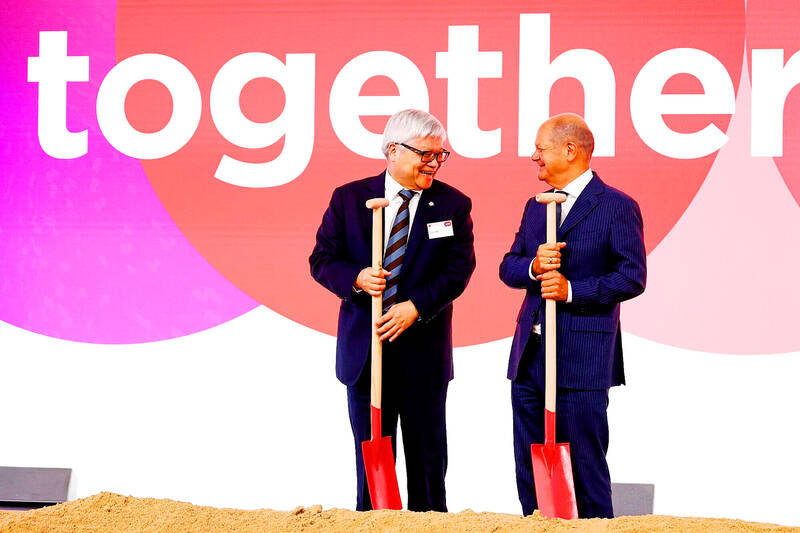The German government is preparing billions of euros of new investments into the nation’s semiconductor industry, two months after Intel Corp shelved plans to build a 30 billion euro (US$31.6 billion) chip factory in Magdeburg, Germany.
The new funds would be provided to chip companies to develop “modern production capacities that significantly exceed the current state of the art,” Annika Einhorn, a spokesperson from the German Ministry for Economic Affairs and Climate Action, said in a statement on Thursday.
The subsidies are expected to total about 2 billion euros, said two people who attended an official event about the funding plans this week and speaking on condition of anonymity.

Photo: Bloomberg
The sum would be in the “low single-digit billion euro range,” a spokesperson for the ministry said in response to a query from Bloomberg News, declining to be more specific.
The ministry had published a call for chips companies to apply for new subsidies earlier this month, although the final figures are still in flux. A new government is set to be elected in February and would likely plan its own budget, leaving uncertainty for the chip companies now applying for the subsidies.
Governments around the world have been investing public funds in the chip industry as part of an effort to localize production of components that control everything from cutting-edge artificial intelligence to everyday gadgets. The push comes after COVID-19 pandemic era supply disruptions and as rising tensions between the US and China over Taiwan could interfere with a key source of the essential technology.
The European Chips Act, passed last year, aims to strengthen the bloc’s semiconductor ecosystem and double its market share to 20 percent of global production capacity by 2030.
Germany’s chip sector has faced two major setbacks. Intel’s 30 billion euro chip factory in Magedeburg was on track to be the biggest project supported under the EU’s Chips Act with 10 billion euros in subsidies, but the troubled US company postponed its plans in September.
Wolfspeed Inc. and ZF Friedrichshafen AG also withdrew a planned chips venture in western Germany.
The first rounds of German subsidies under the EU’s Chips Act were granted to Intel and a joint venture between Infineon and Taiwan Semiconductor Manufacturing Co (TSMC, 台積電) in Dresden, Germany.
Germany’s economic ministry wants to use the newly proposed funds to subsidize 10 to 15 projects across a range of fields, including the production of raw wafers and the assembly of microchips.
“The funded projects should contribute to a strong and sustainable microelectronics ecosystem in Germany and Europe,” Einhorn said.

In Italy’s storied gold-making hubs, jewelers are reworking their designs to trim gold content as they race to blunt the effect of record prices and appeal to shoppers watching their budgets. Gold prices hit a record high on Thursday, surging near US$5,600 an ounce, more than double a year ago as geopolitical concerns and jitters over trade pushed investors toward the safe-haven asset. The rally is putting undue pressure on small artisans as they face mounting demands from customers, including international brands, to produce cheaper items, from signature pieces to wedding rings, according to interviews with four independent jewelers in Italy’s main

Japanese Prime Minister Sanae Takaichi has talked up the benefits of a weaker yen in a campaign speech, adopting a tone at odds with her finance ministry, which has refused to rule out any options to counter excessive foreign exchange volatility. Takaichi later softened her stance, saying she did not have a preference for the yen’s direction. “People say the weak yen is bad right now, but for export industries, it’s a major opportunity,” Takaichi said on Saturday at a rally for Liberal Democratic Party candidate Daishiro Yamagiwa in Kanagawa Prefecture ahead of a snap election on Sunday. “Whether it’s selling food or

CONCERNS: Tech companies investing in AI businesses that purchase their products have raised questions among investors that they are artificially propping up demand Nvidia Corp chief executive officer Jensen Huang (黃仁勳) on Saturday said that the company would be participating in OpenAI’s latest funding round, describing it as potentially “the largest investment we’ve ever made.” “We will invest a great deal of money,” Huang told reporters while visiting Taipei. “I believe in OpenAI. The work that they do is incredible. They’re one of the most consequential companies of our time.” Huang did not say exactly how much Nvidia might contribute, but described the investment as “huge.” “Let Sam announce how much he’s going to raise — it’s for him to decide,” Huang said, referring to OpenAI

The global server market is expected to grow 12.8 percent annually this year, with artificial intelligence (AI) servers projected to account for 16.5 percent, driven by continued investment in AI infrastructure by major cloud service providers (CSPs), market researcher TrendForce Corp (集邦科技) said yesterday. Global AI server shipments this year are expected to increase 28 percent year-on-year to more than 2.7 million units, driven by sustained demand from CSPs and government sovereign cloud projects, TrendForce analyst Frank Kung (龔明德) told the Taipei Times. Demand for GPU-based AI servers, including Nvidia Corp’s GB and Vera Rubin rack systems, is expected to remain high,